|
26th November 2019 Tuesday evening at 'The Sovereigns' in Woking continues. The second and final game of the night was 'Architects of the West Kingdom'. As an architect it's your job to rebuild the errr.... West Kingdom! So it appears that in this game, you'll be rubbing shoulders with virtuous members of the clergy and getting 'down and dirty' with shady criminals. The life of an architect, eh? Architects of the West Kingdom is a pretty standard worker placement game, but a worker placement game with a couple of extra little twists. What's in a game? There's quite a lot to Architect of the West Kingdom and this is reflected in the components.
Hows it play? Setup
There are 3 ways to place workers in the game, this is dependant on the symbol used on the game board:
And there's still a bit more to go in explaining the game.
Endgame Play continues until the Guildhall has been filled by workers (Different according to the number of players.). When this happens, all players get one more turn and then scoring begins. There are several factors that affect scoring:
Overall
There are a couple of interesting mechanics in Architects of the West Kingdom, particularly how they interact with each other. Being able to put multiple workers into a space to gain increasing results seems overpowered. But when a player puts a lot of workers into a single space, they can just become a target for another player to capture. Obviously when capturing workers, players will want to do it as efficiently as possible, because there's money to be made when putting them in prison. If a player can predict their opponent's moves, stealing their workers can really screw with them. Another thing to consider is that players have no way to get their workers back other than having them captured by other players or capturing them themselves. Being able to manage your workers in this way can avoid those pesky debt cards, which themselves are a clever little addition to the game. The virtue track, black market and cathedral also add an extra element that helps differentiate the game. I enjoyed this game, I think it's fairly good.Generally I felt like I always had options and meaningful decisions to make. Which all I really want from a game. If you really like worker placement games, you'll probably like Architects of the West Kingdom. It's just different enough to justify its existence. Or, if you don't own any worker placement games and you want one. You may want to consider this game,
0 Comments
26th November 2019 Tuesday gaming night at 'The Sovereigns' is here. The first game of the evening was 'Nine Tile Panic'. Nine Tile Panic is a game that comes in a little box that delivers a lot of stress! This is a game all about building a city but not just building a city. It's a game about building a city in a strict time limit! Thinking about it, maybe we should get real city planners to play this game? You won't find any unoccupied roadworks in Nine Tile panic let me tell you. What's in a game? 'Nine Tile Panic' has few components:
How's it play? Before playing, give each player a set of tiles. Nine Tile Panic is played over a series of rounds. Each round is scored before play proceeds to the following round. A round goes like this:
Play continues until the score limit has been reached. For a 5 player game this is 25 points. Final scores are tallied, highest score wins. Overall
Nine Tile Panic is a small, quick to learn and quick to play game. A game can be 20 more than 20 minutes. The game is supposed to be fun, but it should be called 'Nine Tile Stress!'. Why? Because there will always be that one player who's going to finish their city too quickly just to watch the other players suffer! That's why. Always! You'll be swearing under your breath as any strategy you've concocted will fly out of the window and you'll just be trying to make any city you can! And seriously, that's what makes Nine Tile Panic a good game and fun too. If you have friends who like real time games, you should play this with them. And if you have friends who hate real time games you should definitely play this with them! 24th November 2019
Sunday gaming at 'The Sovereigns' comes to a conclusion. The final game of the day was 'Mysterium' Read my blog about it here. 24th November 2019 Sunday at 'The Sovereigns' in Woking continues. The next game was 'Codenames'. I have it on good authority that spies, above all other things, really like having codenames. So it's a good thing that the game 'Codenames' is all about spies. Actually, it's a team based card game about words, but I digress... Whats in a game? blah
How's it play? Codenames requires a bit of setup.
Overall
When describing Codenames I've not really explained the dilemma and challenge facing the spymaster players. The example I used had 'cat', 'pigeon' & 'ant' as all being blue. But in reality, it's more likely that not all of them would be the same colour, 'pigeon' might be red. Now the blue spymaster could simply say, "Animal, two.". But then they run the risk that the team might select 'pigeon' instead of the other choices and if they select the wrong word first, it stops their turn straightaway! So the spymaster has to select clues that don't draw their teammates to the wrong answer. This can be downright tricky. Now the spymaster could play it safe and select, "Meow, one." for 'cat' and use 1 word clues. The problem with playing it safe though, is that it probably won't win you the game unless you're already ahead. So doing 2 or 3 word clues can be a good way of getting ahead. The same principle applies to the other team members. When the spymaster gives you a clue for 3 words, managing to find all of them grants the team a good advantage. But getting wrong can prove a bad thing. It's a good implementation of a 'risk/reward' mechanic. A successful risk pays off and a unsuccessful risk penalises. There's only one small drawback to Codenames and that is that it basically needs at least 4 players to play and ideally even numbers of players too. The game goes up to 8 players, but I can't see a reason why team size should be limited to 4 (Other than it takes a longer to come to a consensus with bigger teams!). Codenames is easy enough to learn to be a 'crossover' game and has a high replay value. It's probably a bit too long for a filler game, but makes an excellent party game. Particularly when with larger groups and/or family members. 24th November 2019 Sunday at 'The Sovereigns' in Woking. The 50 Fathoms hiatus continues, so it's board games instead. We began with 'Tsuro: The game of the Path'. And that's what Tsuro is, a game about paths, quite figuratively. It's also quite abstract and there's not much to say about the theme. What's in the game? The game comes in a small package.
How's it play? Set up is quick and simple.
Endgame Play continues until one of the following conditions are met:
Overall
Tsuro is a small game, quick to setup, quick to learn and quick to play. It is essentially a light 'programming' game that requires a small amount of scrutiny and forethought to try and predict your moves. The real danger in the game however, comes from the other players, it's impossible to predict what tiles they will play and its impact on you. Essentially you can't rely on planning more than 1 move ahead and have to adapt to other player's moves as they occur, this is particularly true later in the game as the board becomes fuller and options become smaller. All this unpredictability makes Tsuro fun, as long as you don't try and think too much about what moves you can make. Additionally, Tsuro plays with up to 8 participants, combined with it's accessibility make it a good choice for party games and fillers. 19th November 2019
Tuesday board games at 'The Sovereigns' in Woking continues. The final game of the night was 'Sushi Roll' See my blog about it here. 19th November 2019
Tuesday, it's the evening, we're at 'The Sovereigns' in Woking, that can only mean one thing, games night! We began with 'Splendor'. My blog about it can be found here. 17th November 2019 Sunday lunch time has rolled around and we're at 'The Sovereigns' in Woking. The 50 Fathoms hiatus continues. Today we played 'Concordia' Concordia is a resource gathering and economic expansion game set in the Roman era Mediterranean and surrounding areas. Ah, where would 'euro style' games be without the Roman era Mediterranean? Probably set even more in Renaissance Europe! What's in a game? Concordia has quite a lot of components.
It's worth mentioning the games resource tokens, normally it would be typical for the components to be coloured wooden blocks. Not so in Concordia, the tokens are shaped like the resource they represent. Thus the brick tokens look like clay bricks, wine tokens look like wine jugs and so on. It's a nice touch. Hows it play? Concordia has a fairly detailed setup. So, here we go.
The very basics of Concordia are simple: The active player plays a card from their hand carries out the action(s) listed on it. Personality cards can be acquired which perform other actions or are better versions of the starter cards. The starter cards are:
There are more types of cards available in the personality deck. There are specialist cards for each type of resource that allows the player possibly gain extra resources. There are also improved versions of starter cards and cards that make certain actions easier to perform. There are some more rules, but this is the gist of it Endgame There are 2 ways to trigger the endgame. If all the personality cards are bought or if a player builds or their houses. Then the final round is completed. Scoring is quite detailed and involved, in fact almost convoluted. All cards are attributed to 1 of 6 Roman gods such as Saturn, Jupiter, Mars etc. Each 'god' is scored differently: Mars for example, will score a player 2 victory points per meeple they have on the board per Mars card. All victory points are tallied, highest score wins. Overall
Here's the thing, I quite like Concordia, but I can't put my finger on exactly why? Maybe it's because it's a game about expansion and empire building, but a mercantile empire and not a military one. There is no direct conflict and the worse you can do to another player is to buy a personality card they want, or maybe block a route they want to use. It's all feels very 'eurogame'. Or maybe it's the deck building element. I feel there's something engrossing about having limited actions and needing to optimise strategies accordingly. Thinking about it, if there was too much direct competition between players, the deck building and planning wouldn't work so well within the game. Finally, I thought I would mention the scoring. Because there's 6 different ways to score, it's almost as if you don't need to think about the scoring and can just concentrate on building up your trade empire and let the points take care of themselves. But anyway, all in all, Concordia is a game I enjoy playing. 16th November 2019 Gaming night at 'Matakishi's' continues. The final game of the night was 'Ringmaster: Welcome to the Big Top'. Step right up! Step right up! Come and see which player can creates the most magnificent circus. Watch! As players become catastrophically confused by cunning card-plays of weirdness Gasp! As players are perilously perplexed by uncannily unpredictable game mechanics. Yes Sir! All the fun of the circus! What's in a game? Ringmaster is a card and all it has and needs is a deck of cards. All the cards are illustrated with nice and occasionally humorous pictures. Many of the cards are tongue-in-cheek. Finally, the game comes with a nifty little draw string to to carry the game in, if you don't want to lug the box about. It's a cool little addition. How's it play? First, the deck is shuffled and 3 cards are dealt to each player, the remaining cards from a draw deck. A first player is then determined. The active player draws a card from the deck and then plays 1 card. There are 4 types of card in the game:
I can't really explain much about the rules, because players simply do what's written on the card they're playing. Endgame There are no endgame conditions in Ringmaster! OK, that's a bit of an exaggeration, but the endgame is determined by cards that are played. This means that different players will most likely have different winning criteria. This makes Ringmaster unpredictable and the game tends to end very suddenly and abruptly. Overall
Ringmaster ticks the right boxes! Easy to learn, quick to play and fun. As well as random ending conditions, there are cards that occasionally completely change the game, forcing all players to discard their entire hands or every card they've played etc. Ringmaster can be random and chaotic, but retains enough strategy to still engage players. If you've just spent the last 3 hours playing a monstrosity of a game that's made your brains dribble out of your ears. Then Ringmaster makes a great finisher for the evening. 16th November 2019 Saturday night gaming at 'Matakishi's' continues. The second game of the evening was 'High Society'. Some people are just obsessed with reputation, luxury, wealth and prestige and will pay anything to elevate it. Well almost anything. These are the trials and tribulations 'endured' by the aspiring wealthy and privileged, where image is everything. What's in a game? High Society has broadly speaking 2 types of card.
How's it play? First give each player a 11 card bidding deck. Then shuffle the status cards to form a deck and determine a starting player.
Endgame 4 cards in the status are coloured green, they are the 3 prestige cards and one of the scandal cards. When the 4th green card is drawn, the game ends immediately - there is no bidding on the 4th green. Next is the game's sting in the tail. The player who has the least amount of money in their hand is eliminated from the endgame! The remaining players total the value of their luxury cards and modify them by any prestige/scandal cards they have. Highest score wins. Overall
There's a few clever little things to think about here. Because a player can only add to their bid, players will be faced with tricky choices. If you really want a card a card, do you bid low hoping other players won't try and out bid you? Or do you start with a high bid hoping to discourage others and use less cards. For example: Using a 4 and 6 is worse than using a 10, even though they have the same value, in the first case you're using up 2 cards instead of 1 - and you can't bid if you don't have cards. Also; there's nothing more infuriating then when you want to push up a bid by 1 or 2 and you've got nothing less than a 5 in your hand. The endgame mechanic adds an extra level of unpredictability to the game. A game can last anywhere from 3 to 15 rounds. Players will know when there's a chance that the game will end because they'll see that 3 green cards have been played, but they won't know exactly when the end is coming. All of this can affect how you bid. Finally, there's the player elimination in the endgame. The sting in the tail that constantly niggles and lingers in the back of every player's mind when they're playing. It doesn't matter how well a player has done in the bidding if they're eliminated for having the least money. It is painful. All in all, High Society is a quick to learn game that is quite fast to play and makes an excellent filler game. It's mechanics push players into making meaningful and tricky decisions. Other than constant stress, what's not to like? |
AuthorI play, I paint. Archives
March 2024
Categories
All
|

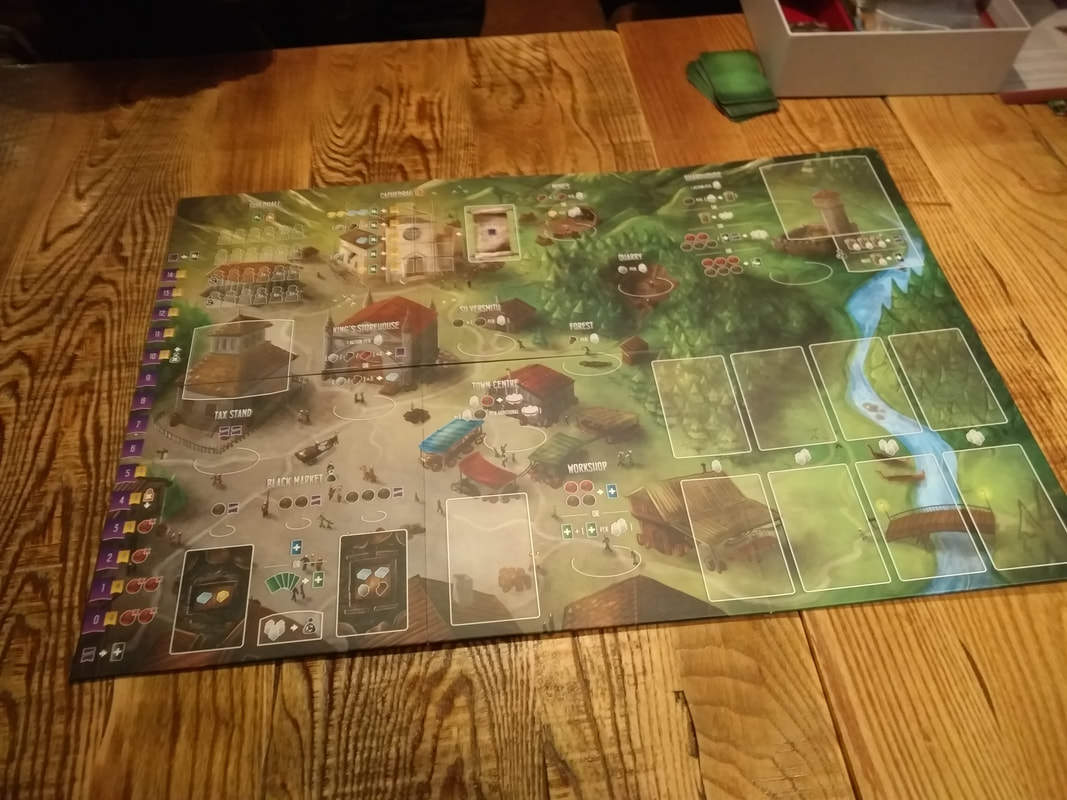
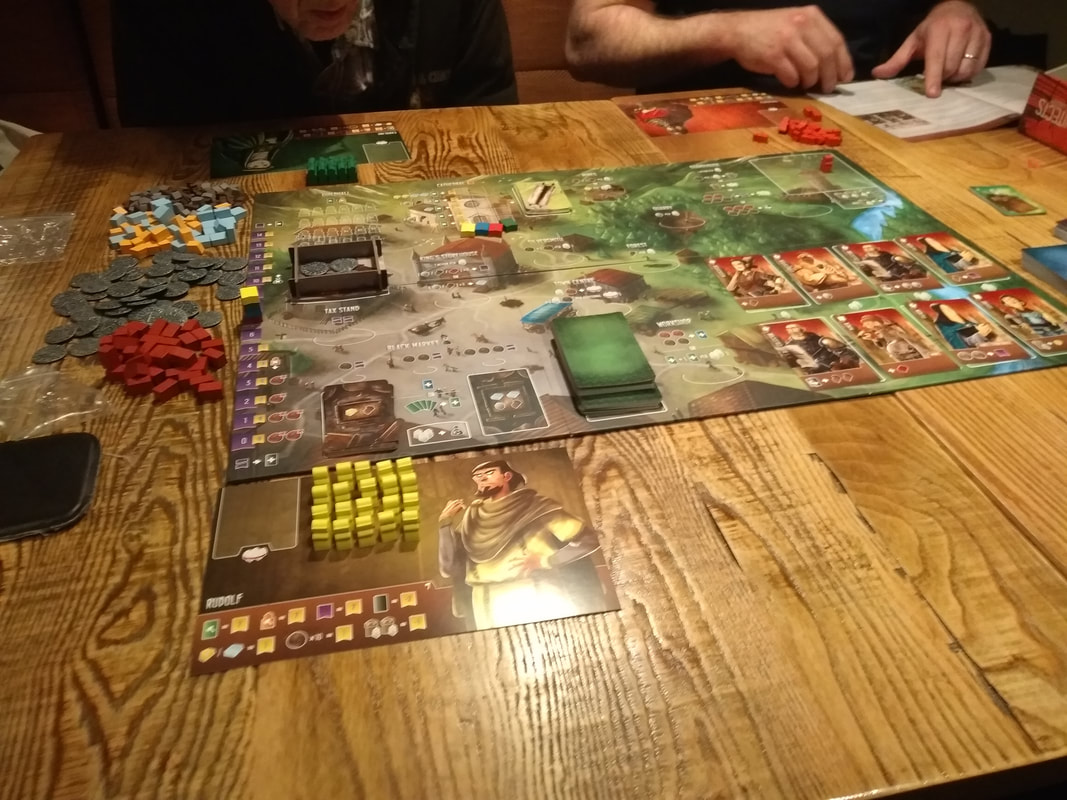
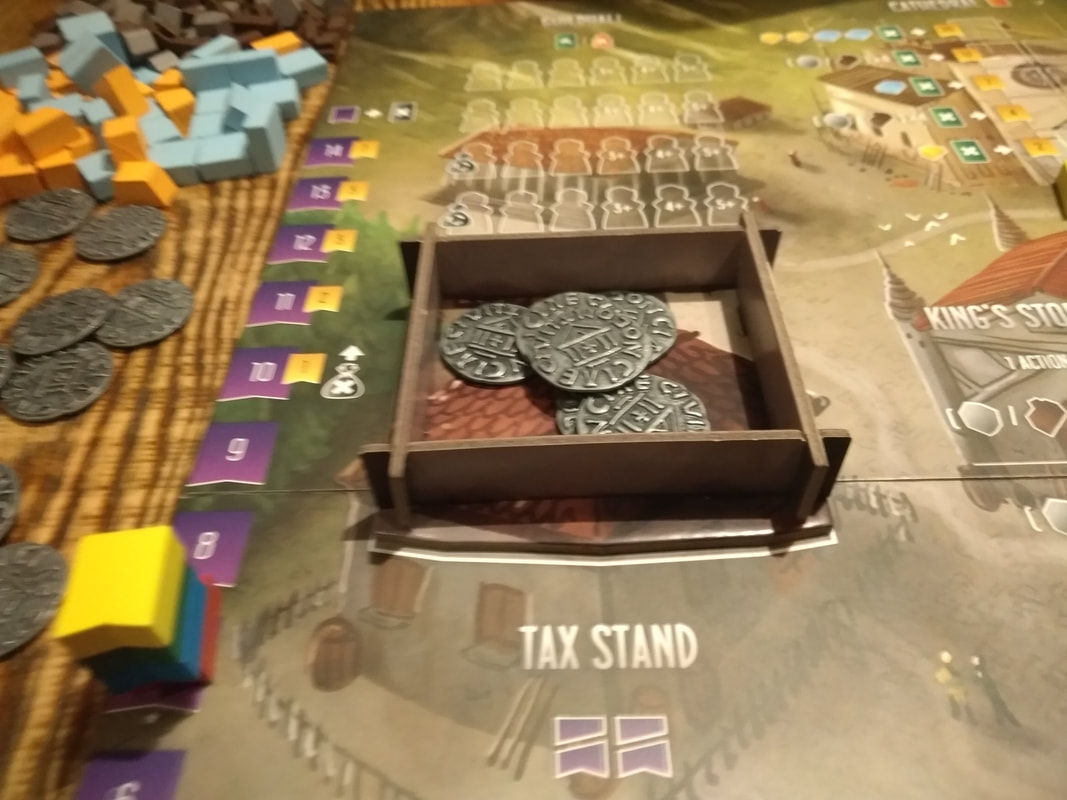
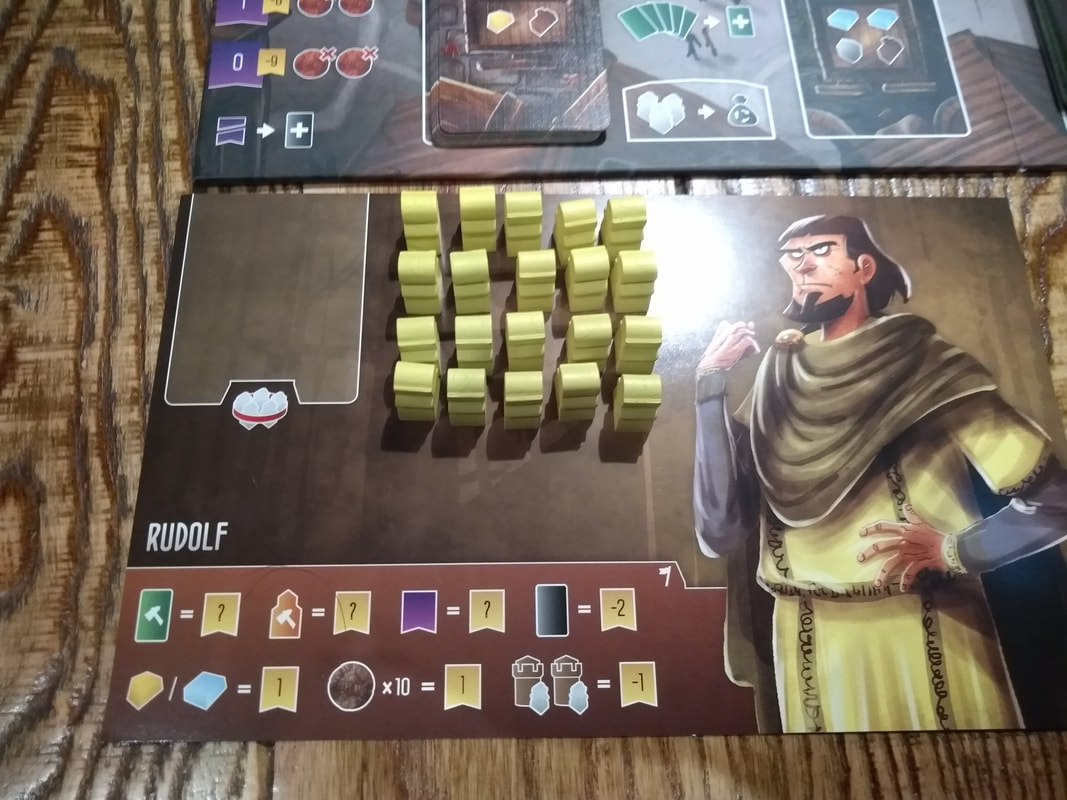
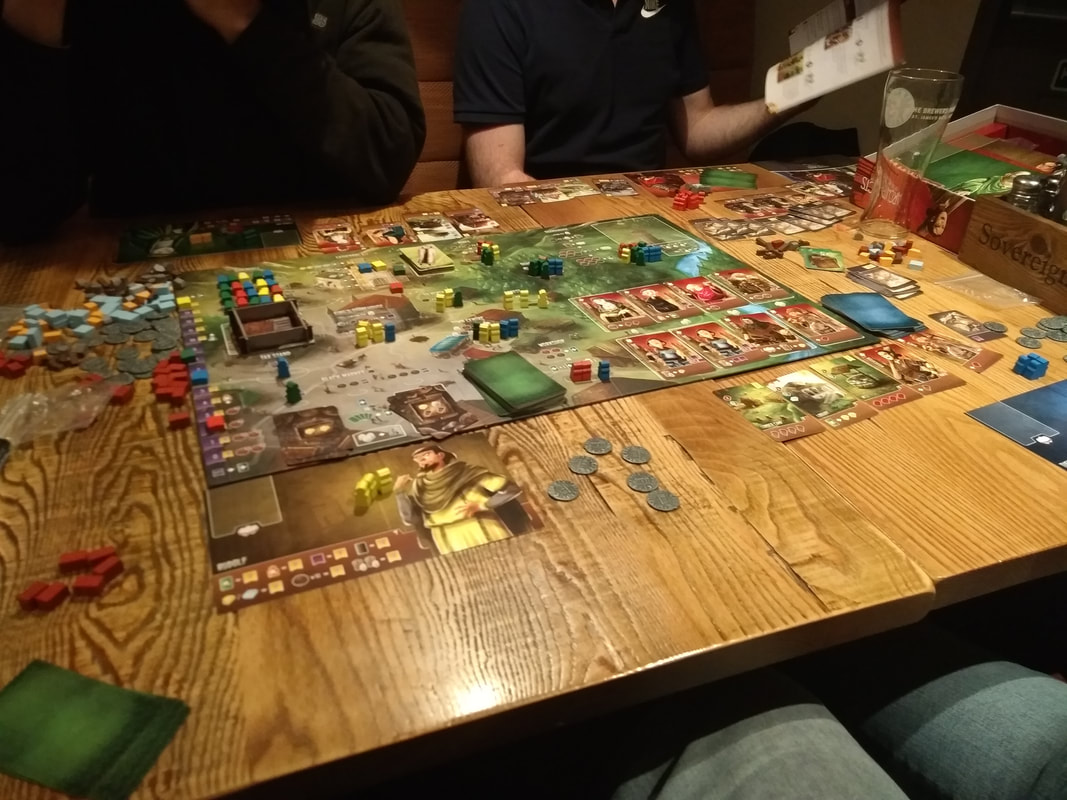
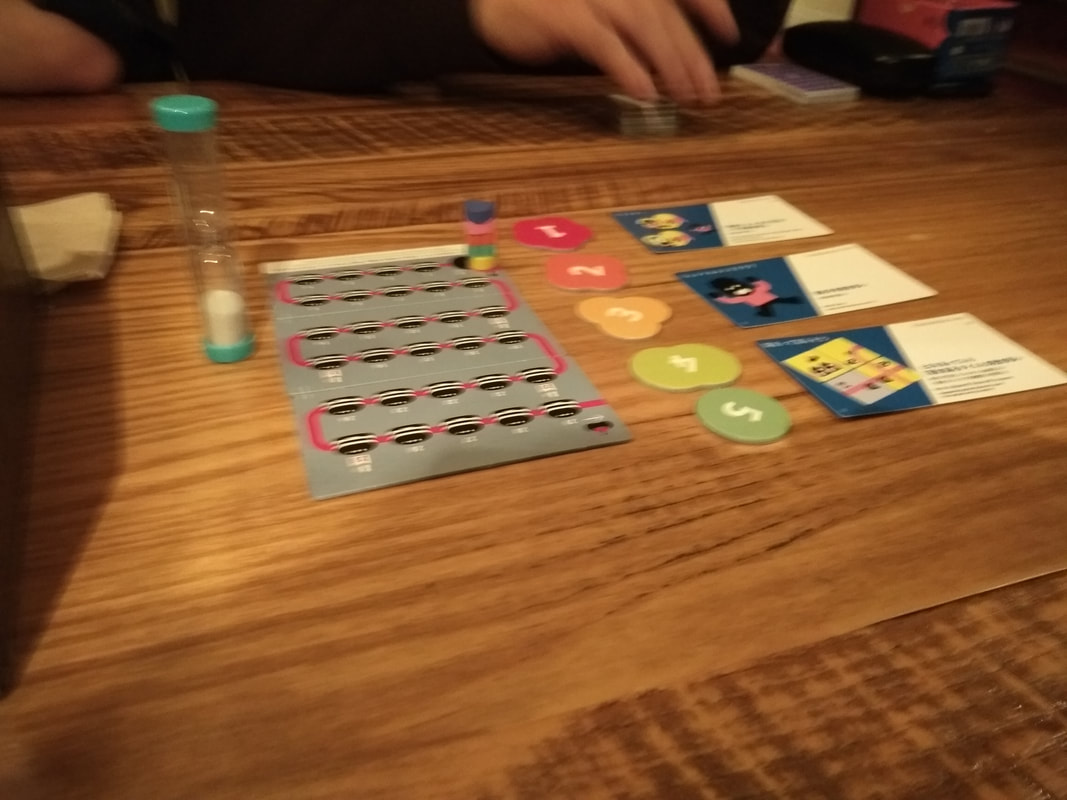
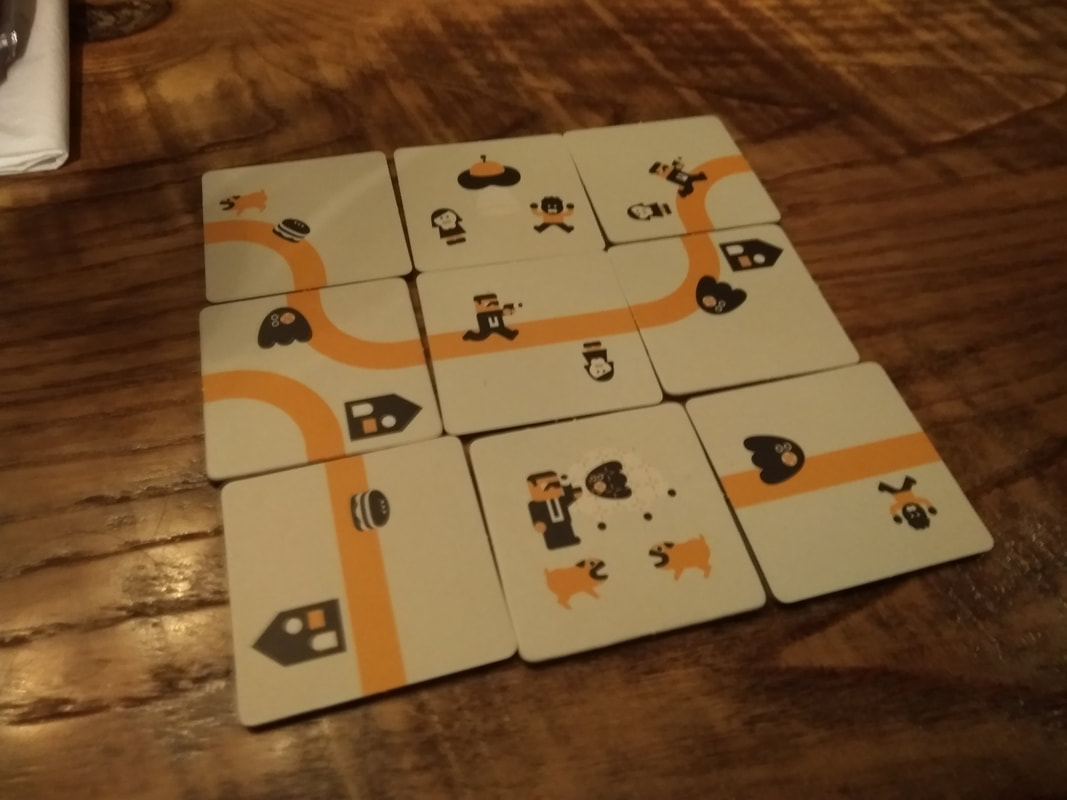
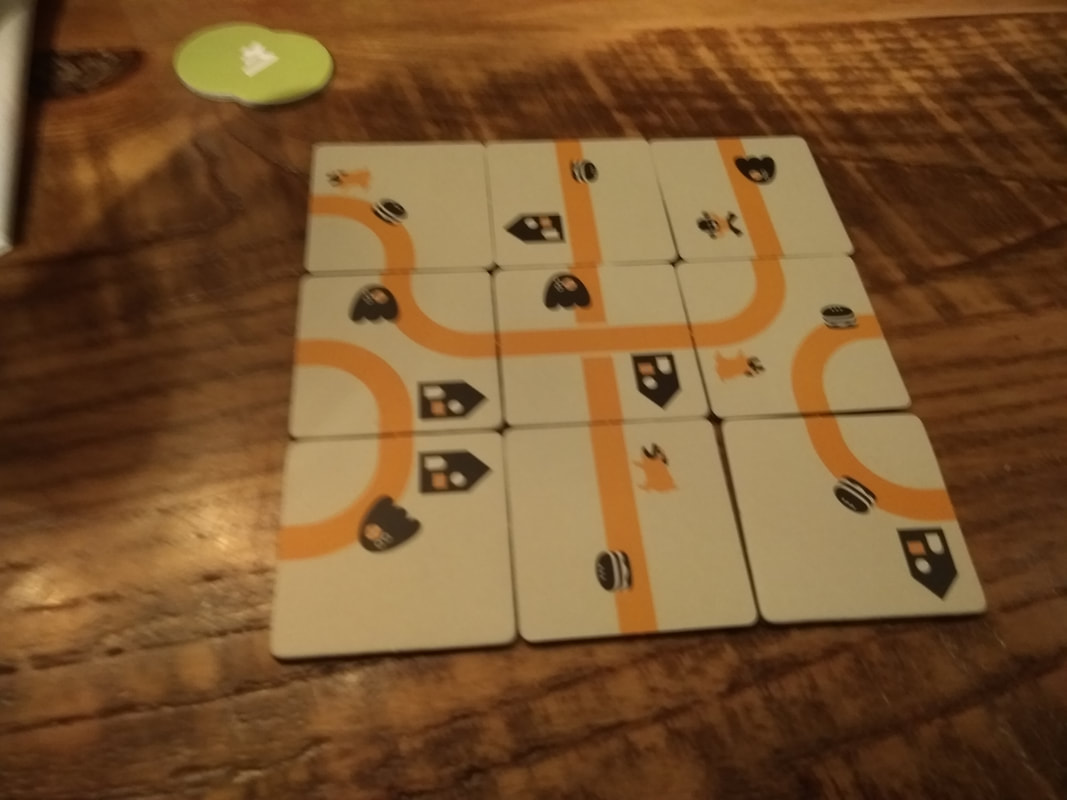
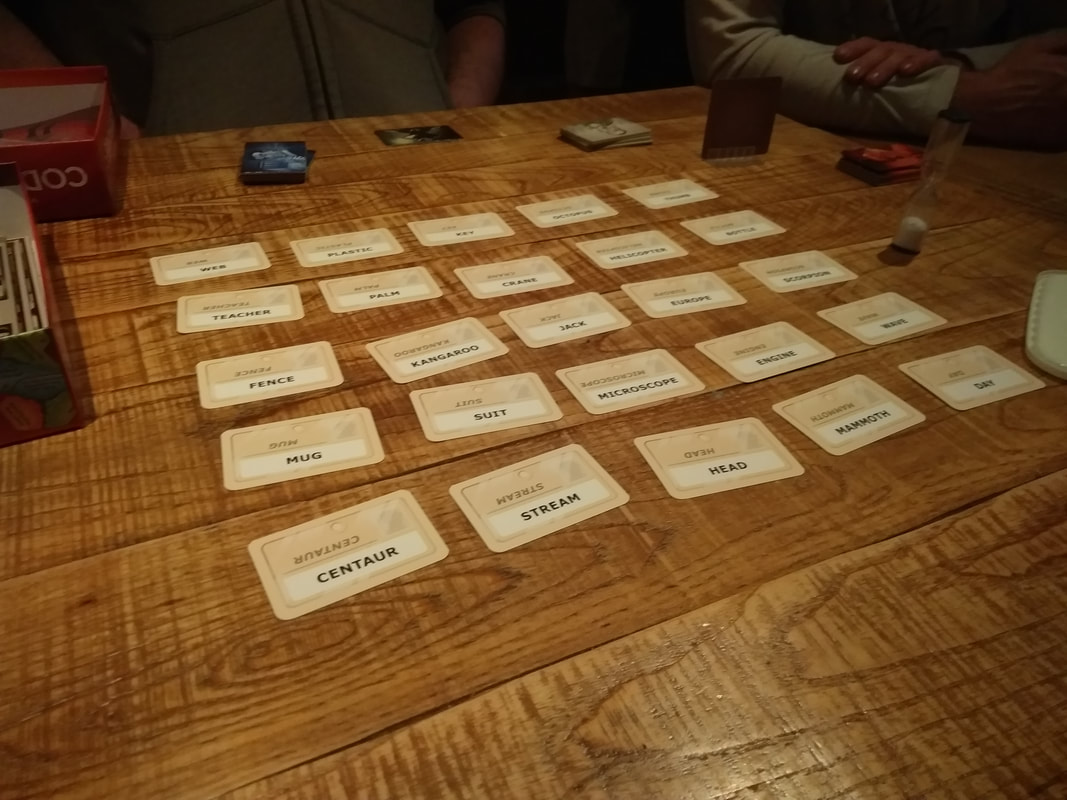
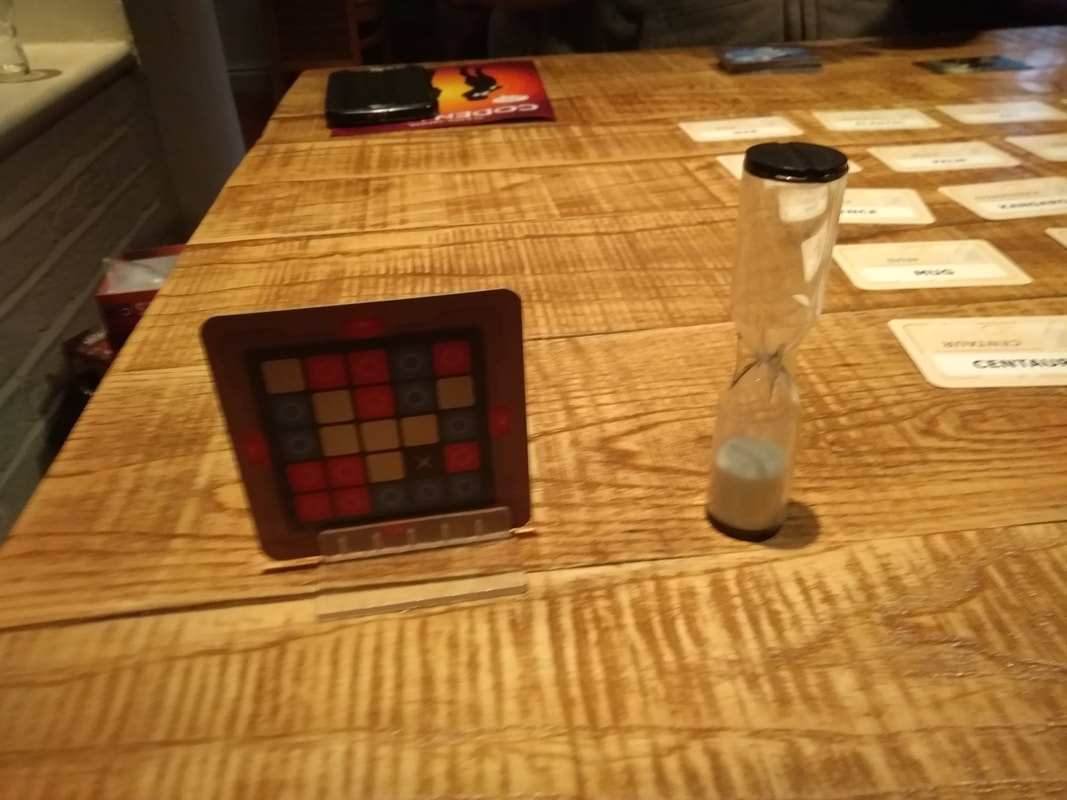
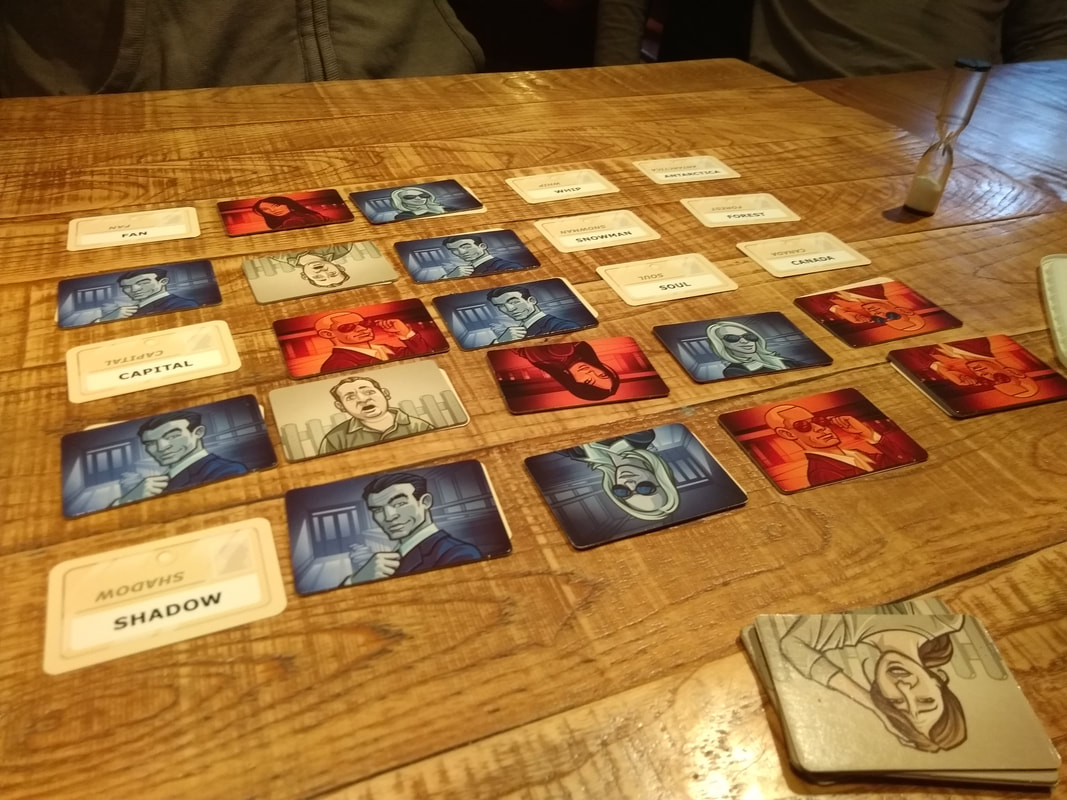
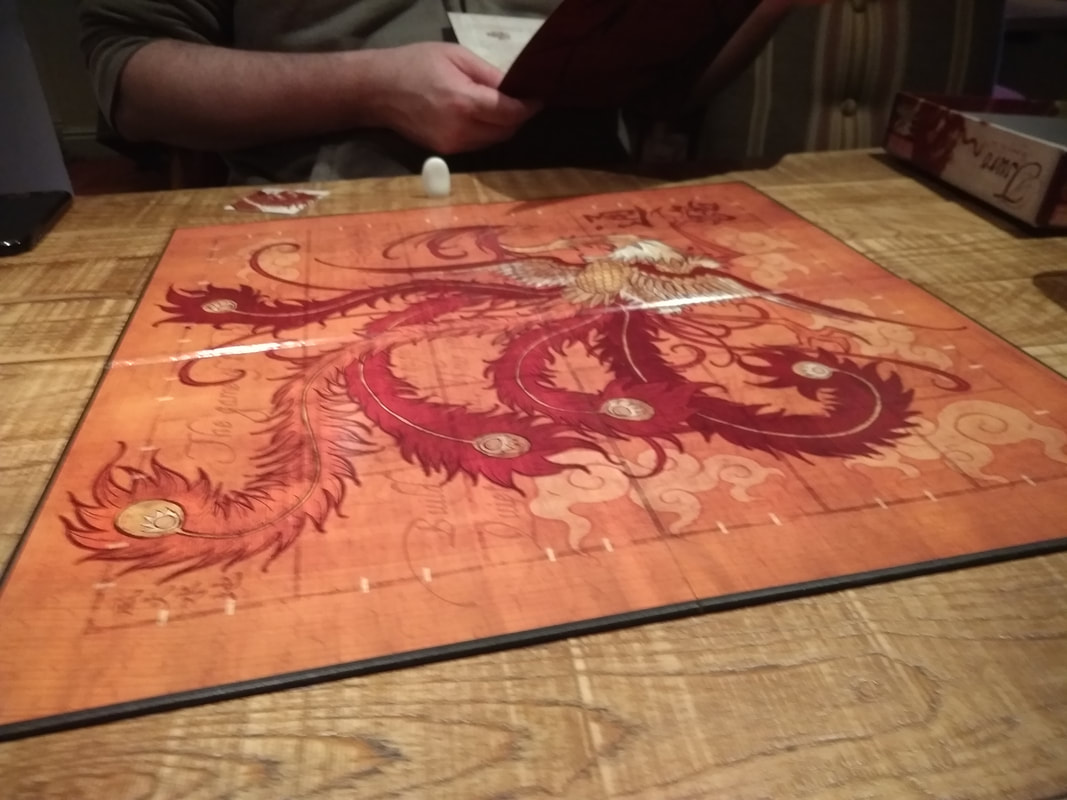
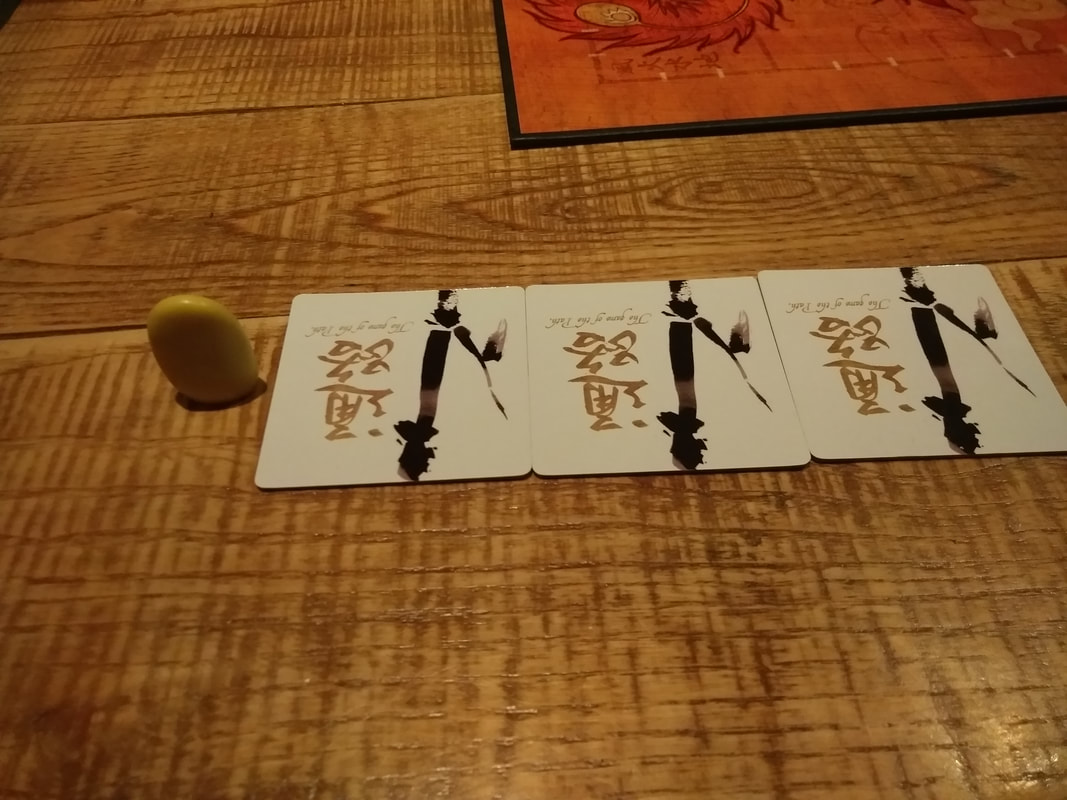
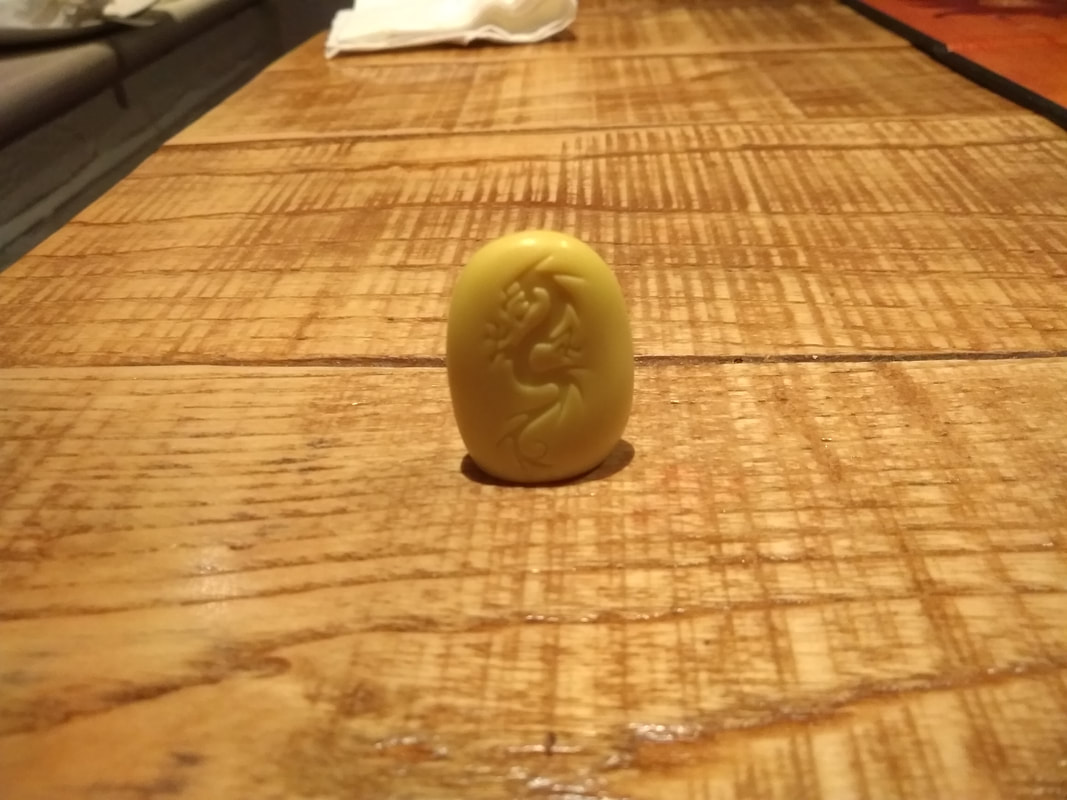
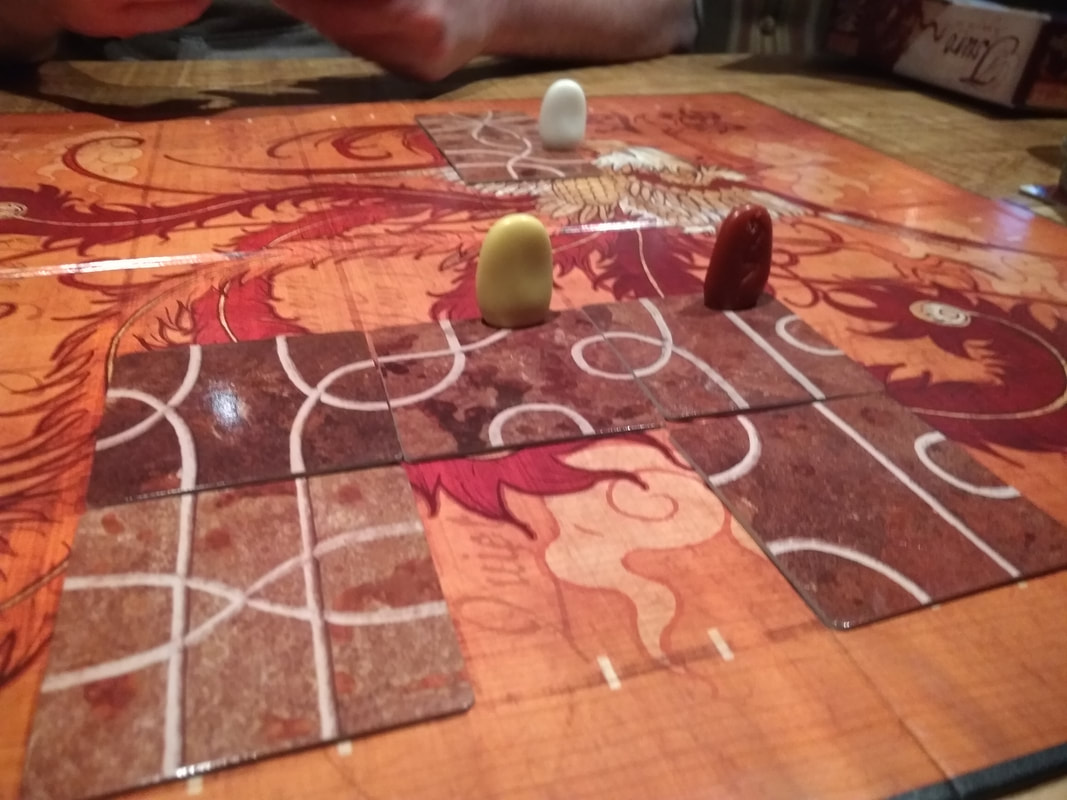
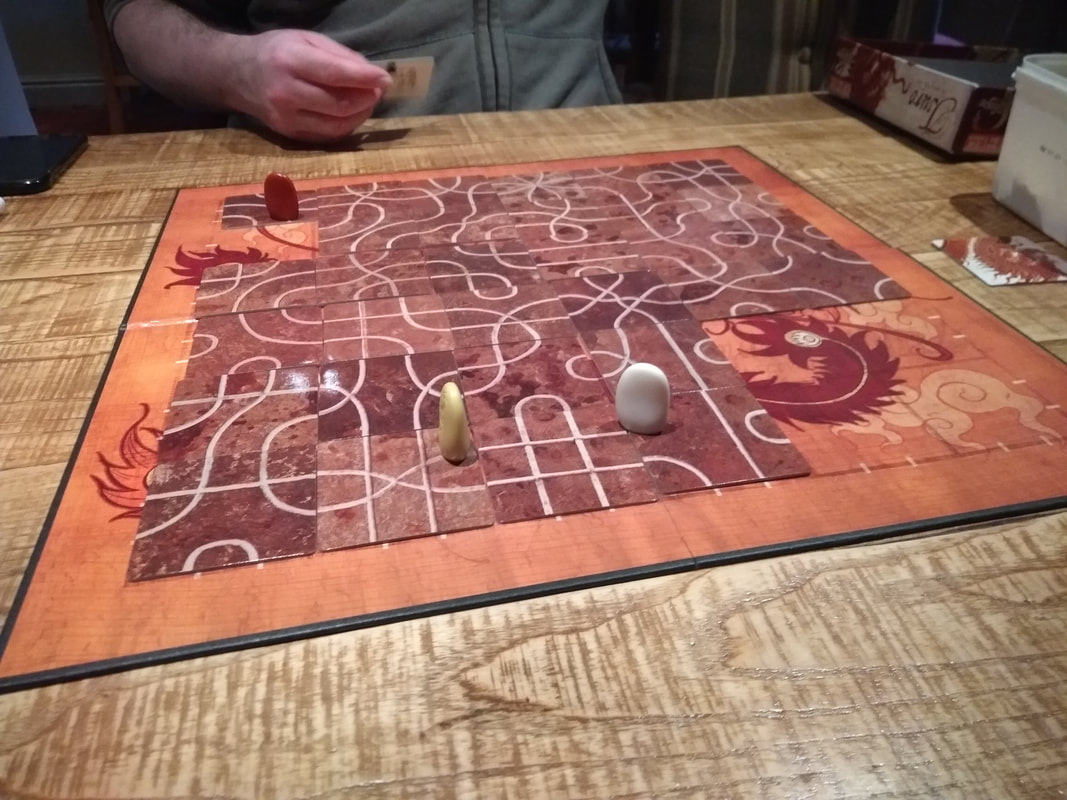
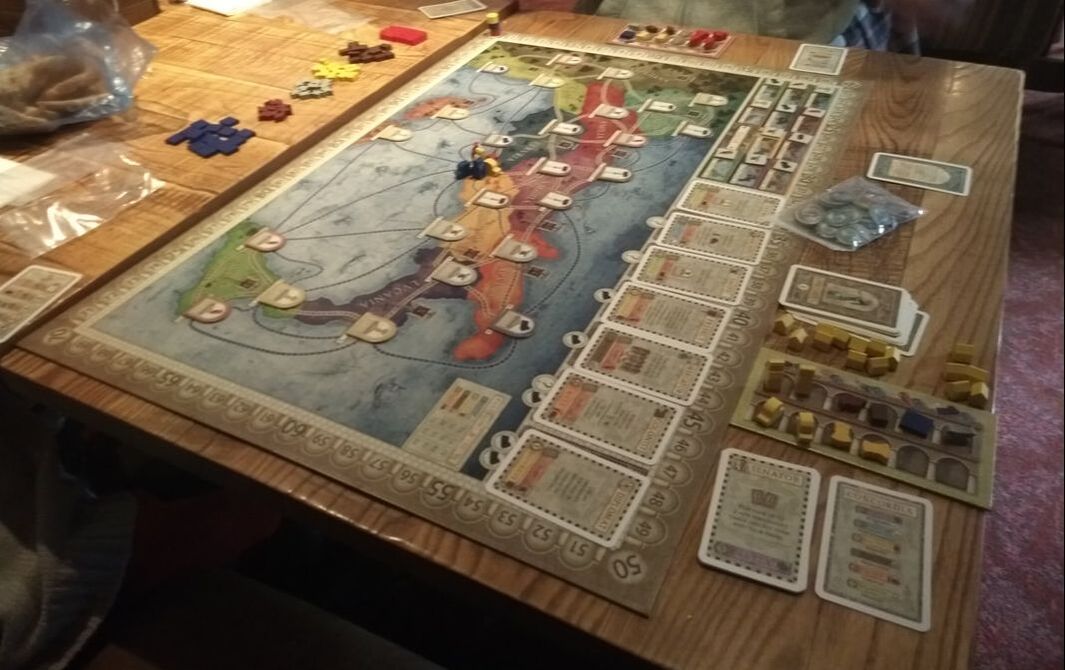
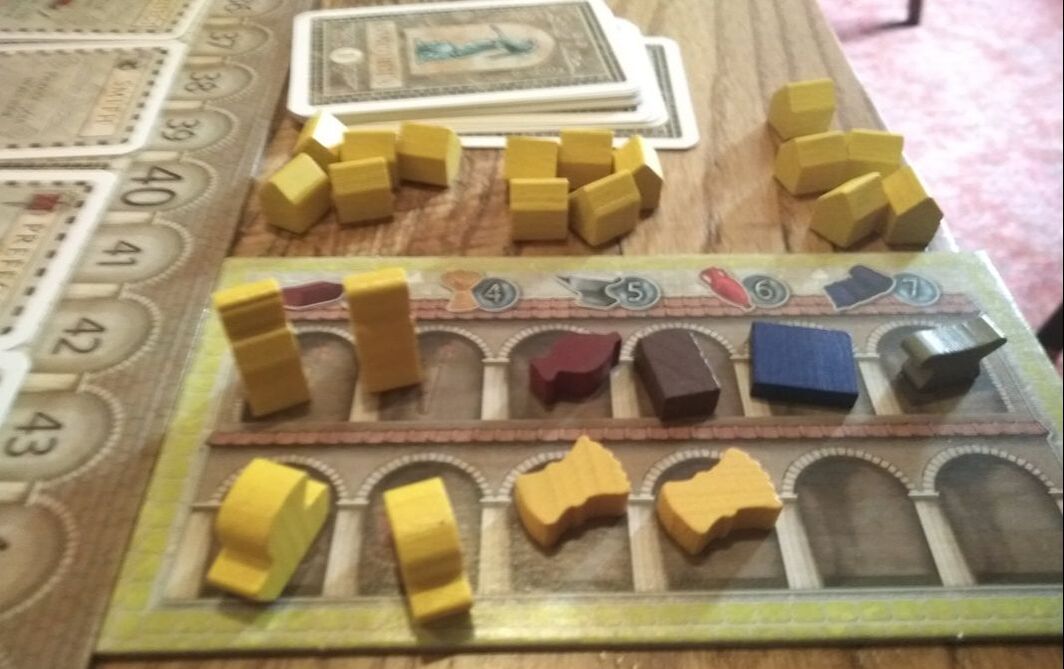
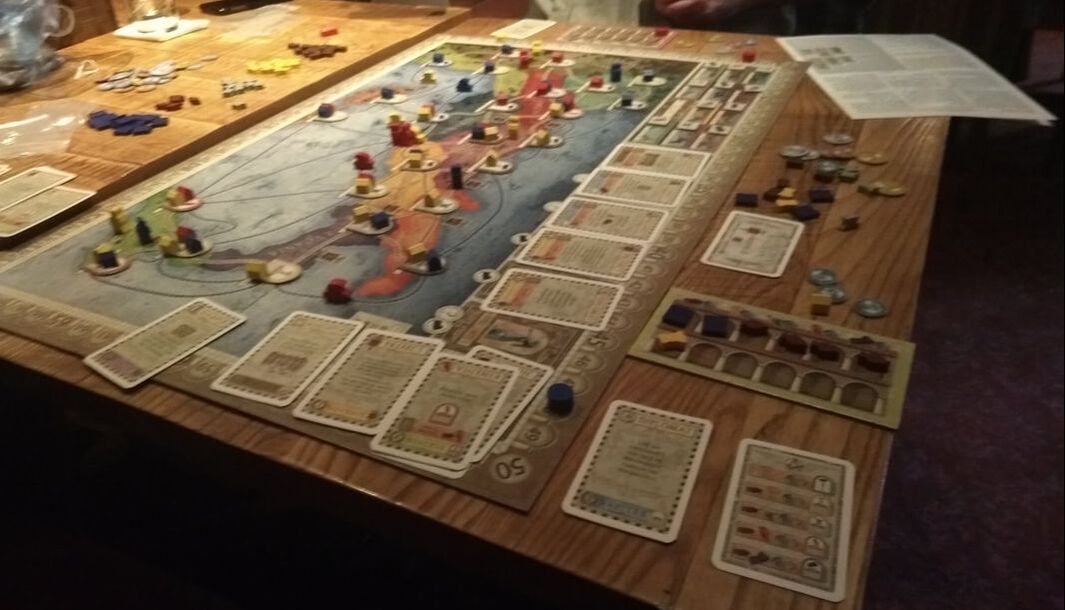
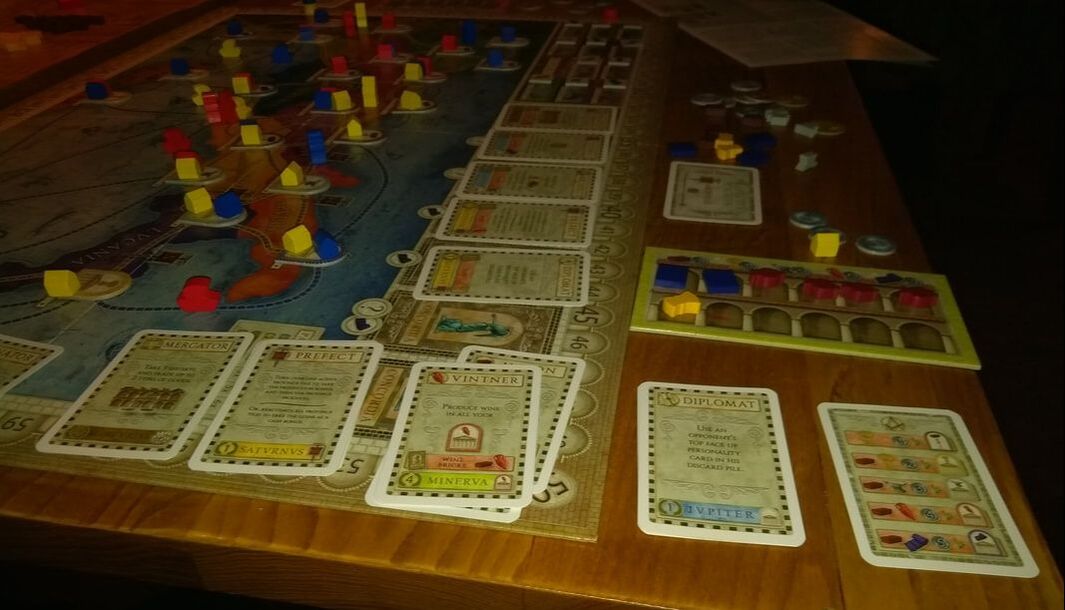
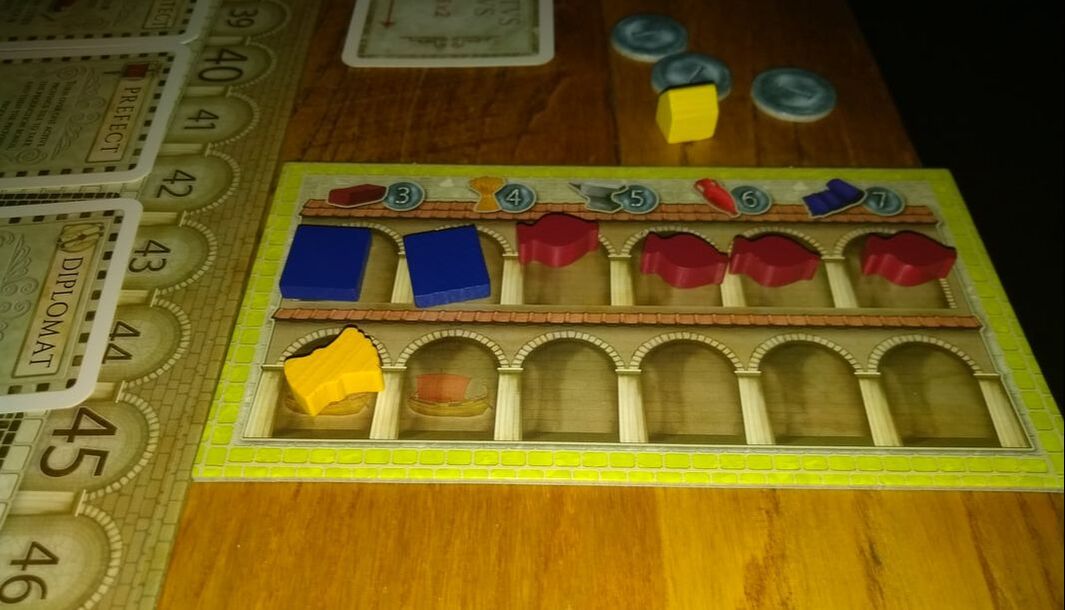
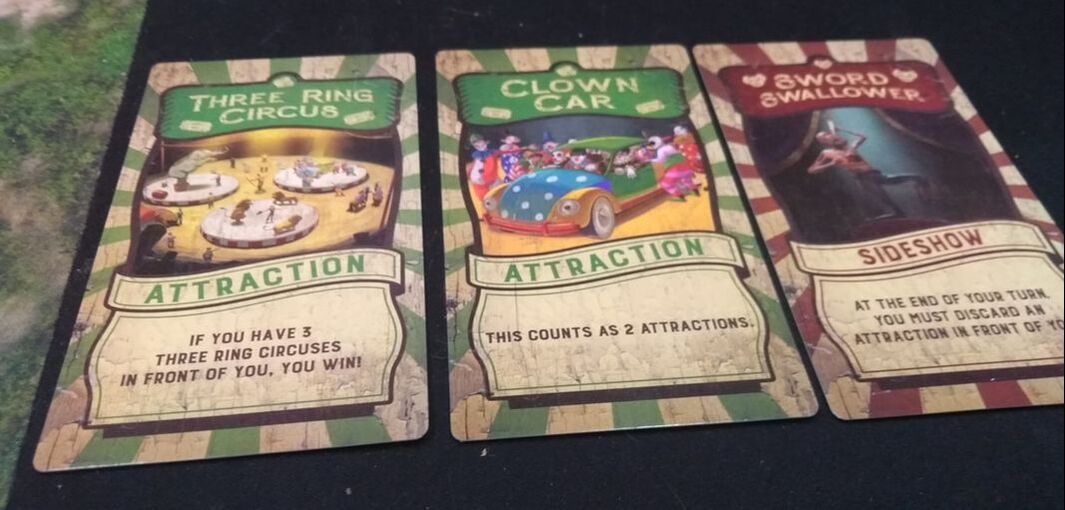
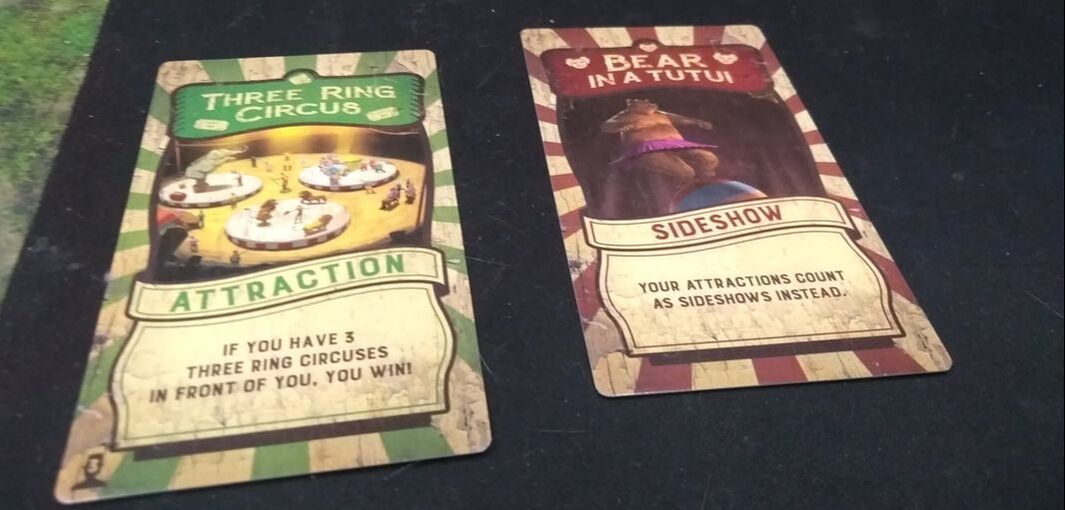
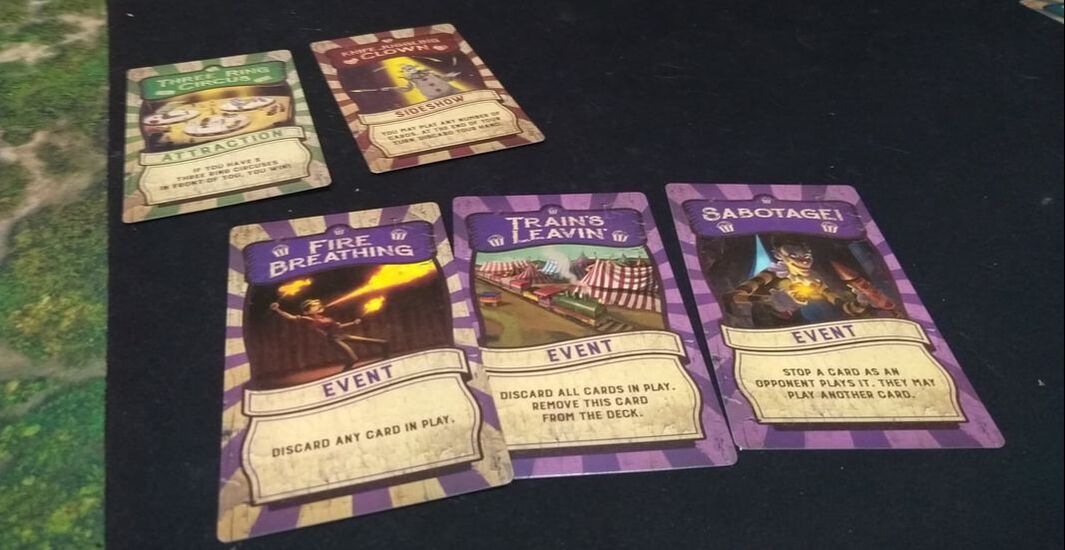
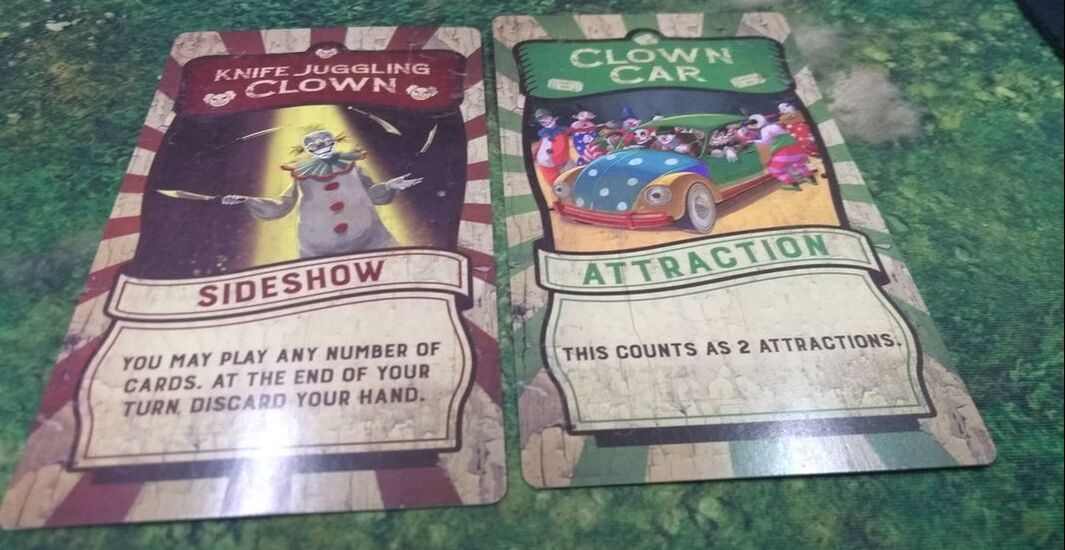
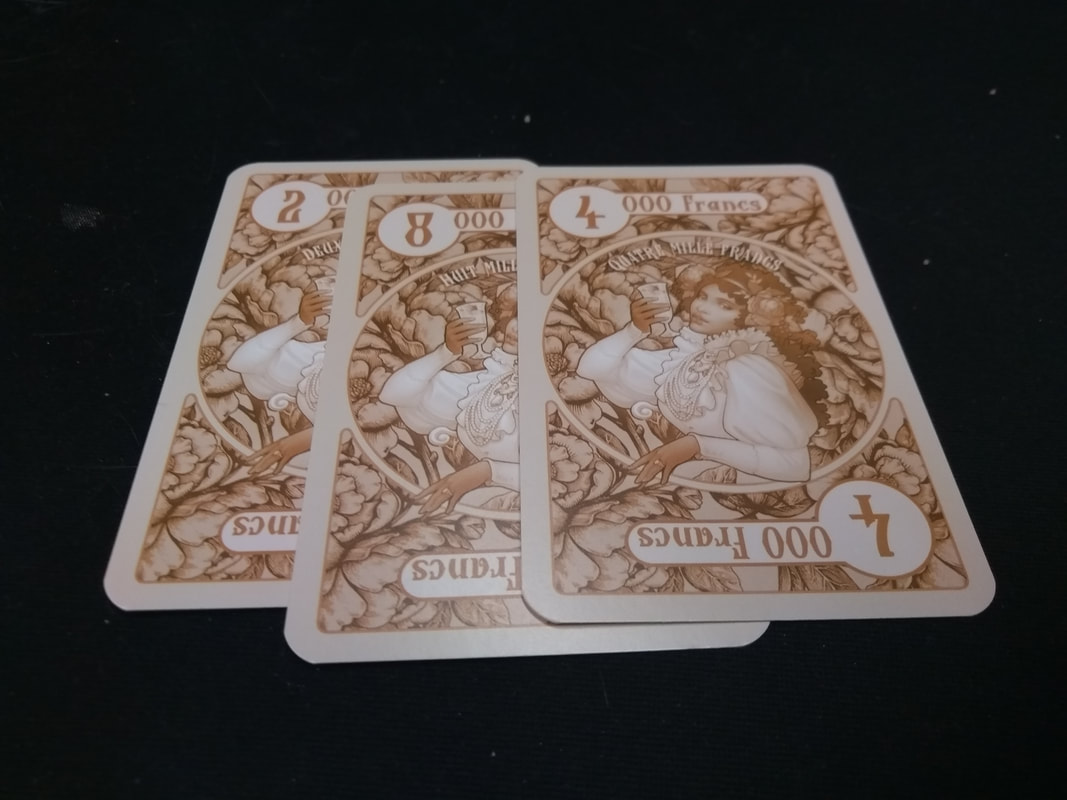
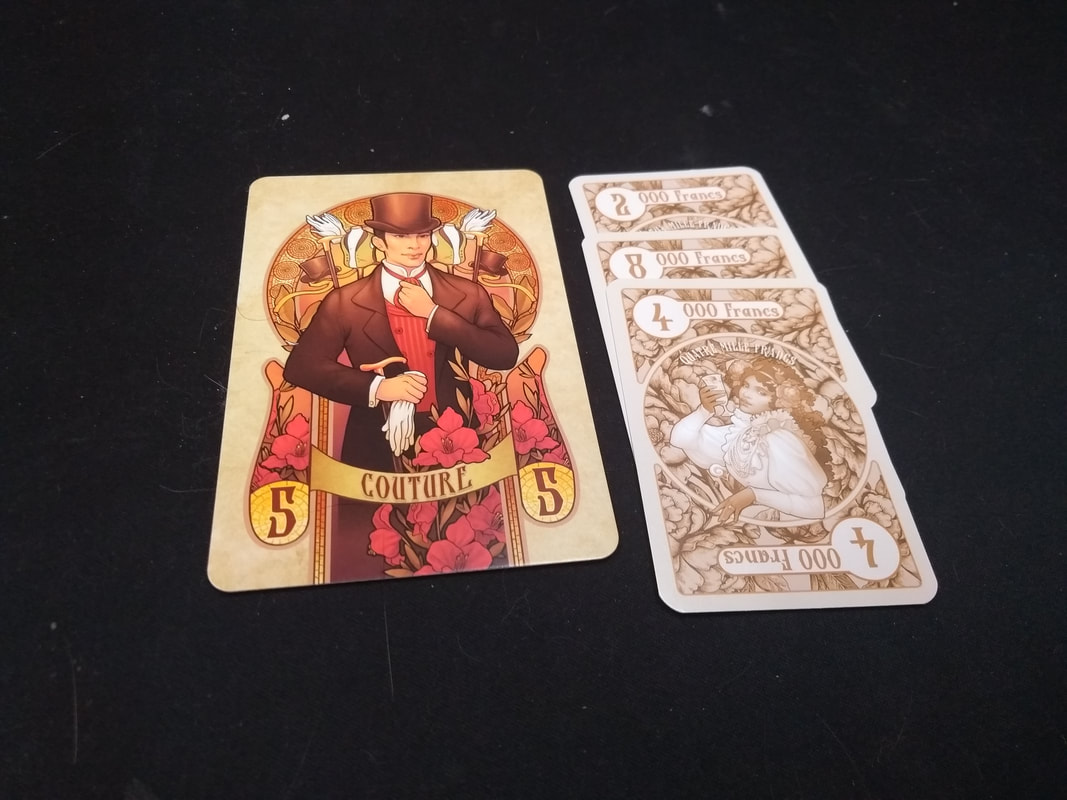
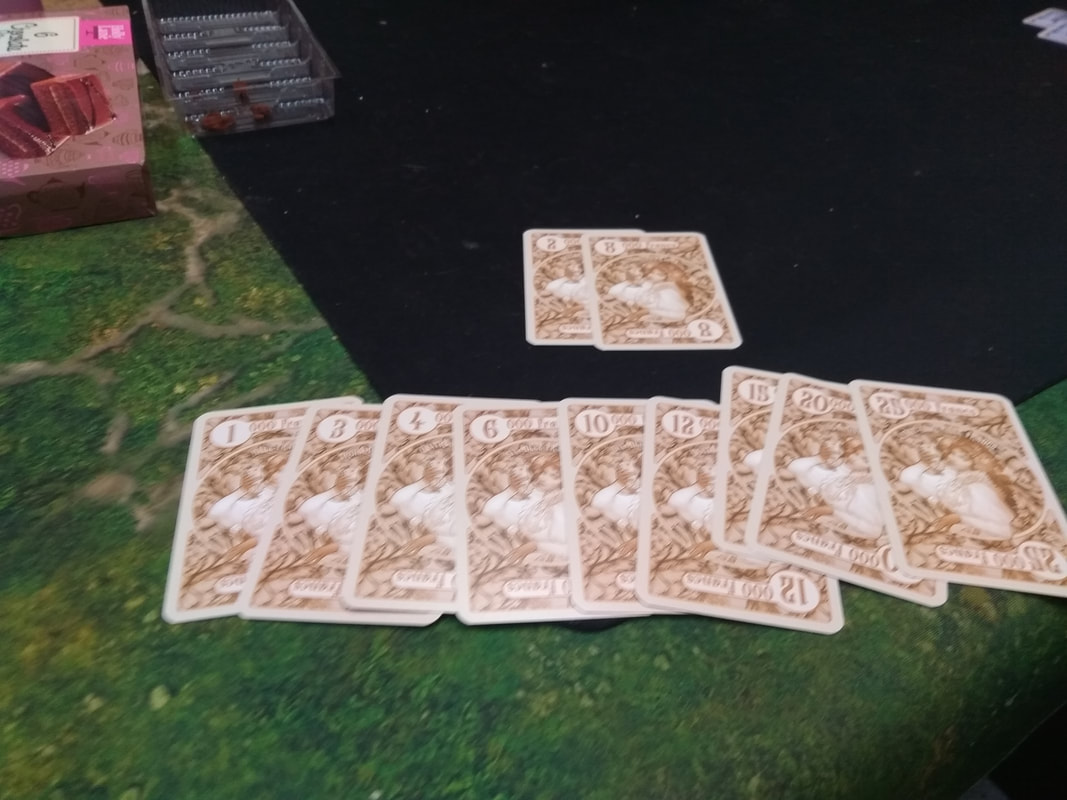
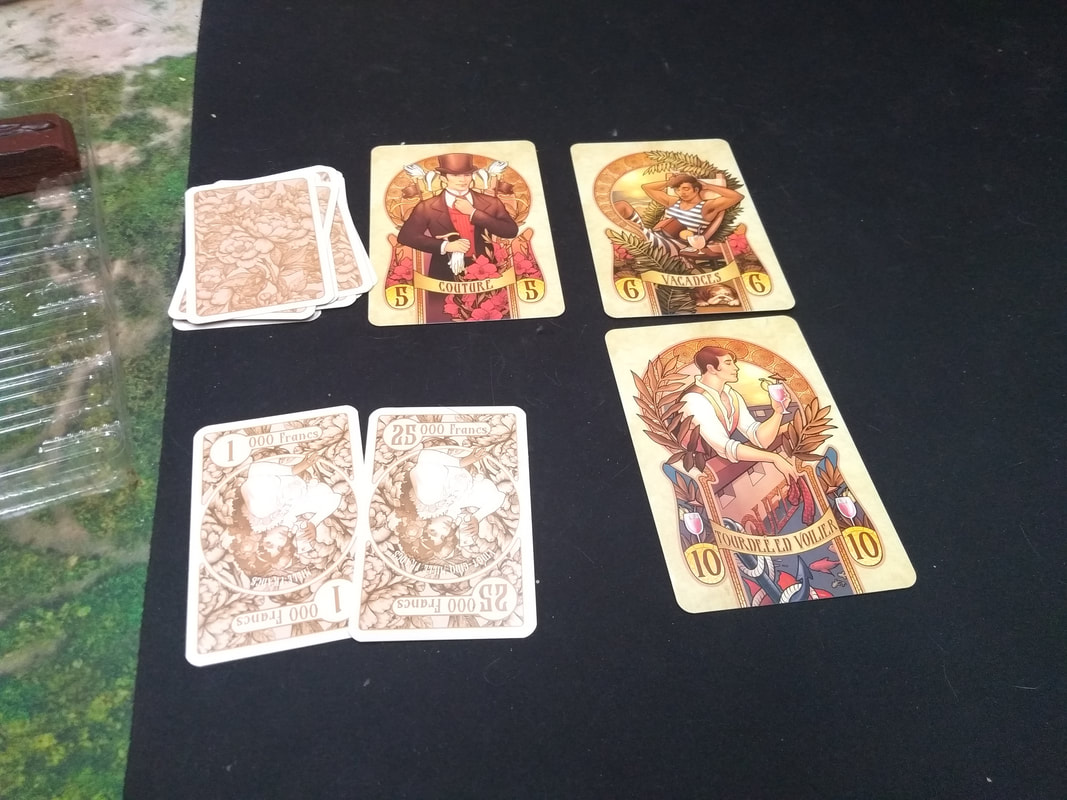
 RSS Feed
RSS Feed
